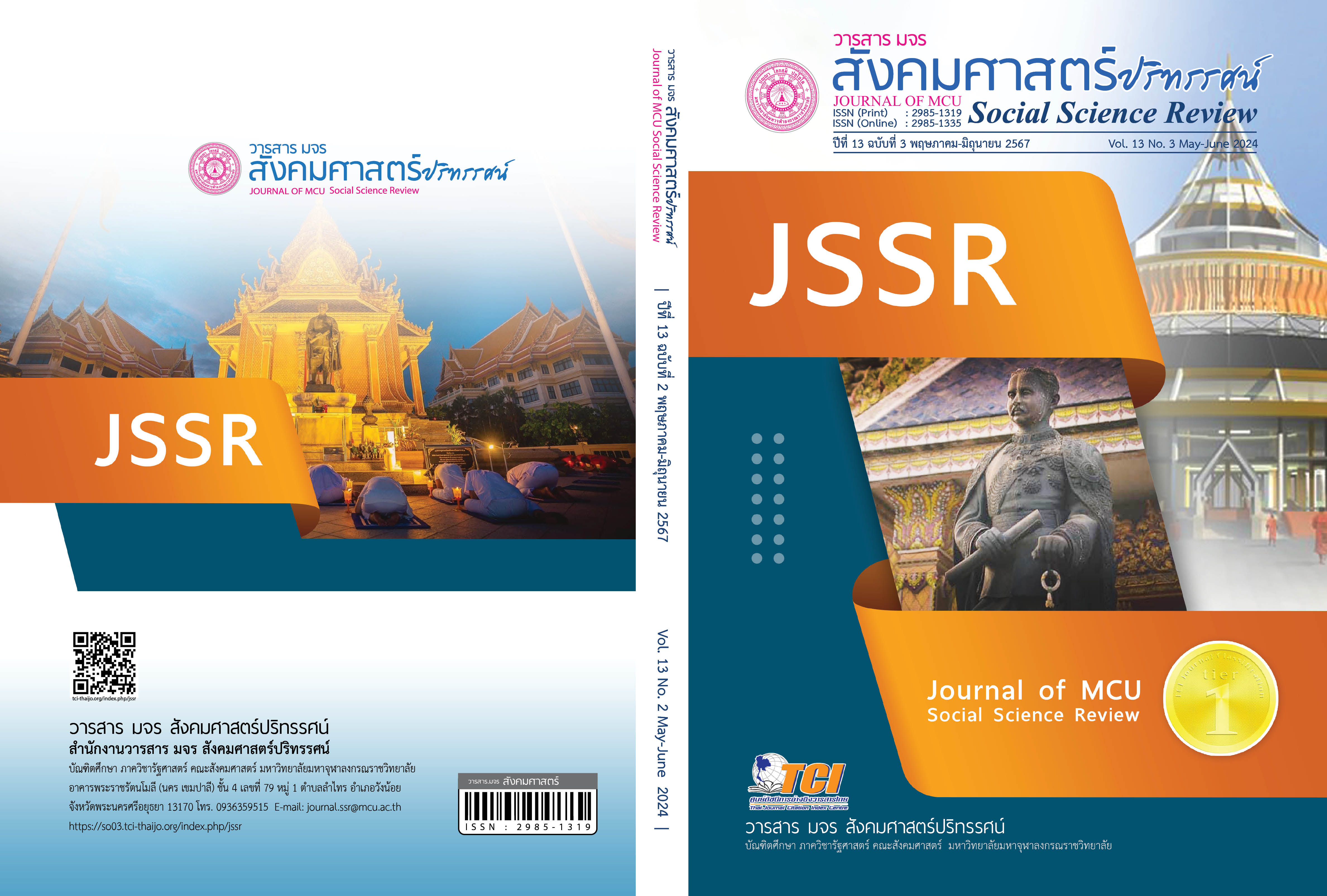กระบวนทัศน์รัฐประศาสนศาสตร์ตามแนวพุทธธรรม
คำสำคัญ:
กระบวนทัศน์, รัฐประศาสนศาสตร์, พุทธธรรมบทคัดย่อ
ในการศึกษาในด้านการบริหารจัดการนั้นเป็นรูปแบบที่มีการวิวัฒนาการทางตะวันตกมาตั้งแต่อดีต โดยเฉพาะการศึกษาทางด้านรัฐประศาสนศาสตร์ที่มีการกำหนดหรือแบ่งแยกเป็นกลุ่มแนวคิด หรือทฤษฎีที่ทำให้เข้าใจในหลักการศึกษาอย่างลึกซึ้ง ในรูปแบบของกระบวนทัศน์ โดยในกระบวนทัศน์นี้เป็นแหล่งรวมแนวคิดการวิวัฒนาการทางรัฐประศาสตร์ ซึ่งทำให้มีความสำคัญทำให้เป็นที่รู้จักและมีการศึกษาอย่างแพร่หลายในทุก ๆ กลุ่ม ซึ่งผู้เขียนมีความคิดเห็นว่าในการศึกษากระบวนทัศน์สำหรับสังคมไทยปัจจุบันนี้ล้วนมีแนวคิดที่มีความแตกต่างกันออกไป และยังเป็นสังคมที่มีผู้นับถือพระพุทธศาสนาเป็นจำนวนมาก ดังนั้นควรนำหลักพุทธธรรม มาทำการวิเคราะห์ในแต่ละองค์ความรู้ที่ของกระบวนทัศน์ดังนี้ คือ หลักสัปปุริสธรรมมีการใช้เหตุและผลในการจัดการองค์การเพื่อให้เป็นรูปแบบของความพอดีในองค์กร การใช้หลักธรรมาธิปไตย และราชสังคหวัตถุเพื่อให้เกิดการพัฒนาความรู้ด้านนโยบายสาธารณะเพื่อให้เกิดความเป็นกลางในสังคม การใช้หลักไตรสิกขา เพื่อเป็นการพิจารณาแก้ปัญหาที่เกิดขึ้นจากการเรียนรู้ การใช้หลักปาปณิกธรรม เพื่อพัฒนาองค์กรให้เป็นผู้ที่มีวิสัยทัศน์ การจัดการได้ดี เป็นผู้ที่มีมนุษยสัมพันธ์ และสุดท้าย คือ การใช้หลักทิฏฐธัมมิกัตถประโยชน์ ต้องการบริหารจัดการอย่างเรียบร้อย เพื่อรักษาผลประโยชน์ไม่ให้เกิดความเสียหาย
เอกสารอ้างอิง
โกวิท วงศ์สุรวัฒน์. (2548). การเมืองการปกครองสหรัฐอเมริกา: แนวพินิจทางประวัติศาสตร์. กรุงเทพฯ: โอเดียนสโตร์.
ปุระชัย เปี่ยมสมบูรณ์. (2552). แนวคิด ทฤษฎี และหลักการรัฐประศาสนศาสตร์. นนทบุรี. มหาวิทยาลัยสุโขทัยธรรมาธิราช.
พระพรหมคุณาภรณ์ (ป.อ.ปยุตฺโต). (2559). พจนานุกรมพุทธศาสตร์ ฉบับประมวลธรรม (พิมพ์ครั้งที่ 34). กรุงเทพฯ: มูลนิธิศึกษาเพื่อสันติภาพ.
พิเชษฐ์ ศรีสุข และสัญญา เคณาภูมิ. (2561). พุทธธรรมกับการพัฒนาตนเองในเชิงรัฐประศาสน ศาสตร์. วารสารวิชาการและวิจัยมหาวิทยาลัยภาคตะวันออกเฉียงเหนือ, 8(2), 111-119.
รัชยา ภักดีจิตต์. (2557). ธรรมาภิบาลเพื่อการบริหารภาครัฐและภาคเอกชน (พิมพ์ครั้งที่ 2). กรุงเทพฯ: บริษัท วี. พริ้นท์ (1991) จำกัด.
วิเชียร วิทย์อุดม. (2551). องค์กรและการจัดการ. กรุงเทพฯ: ธนธัชการพิมพ์จำกัด.
สำนักงานคณะกรรมการการพัฒนาระบบราชการ. (2561). การบริหารงานภาครัฐแบบมีส่วนร่วม. สืบค้น 26 มีนาคม 2563, จาก https://shorturl.asia/oE27Y
Henry, N. (1980). Public administration and public affairs (2nd ed.). Englewood Cliffs, New Jersey: Prentice-Hall.
Sam, A. (2002). Promoting Good Governance: Principle Practices and Perspective. London: Commonwealth Secretariat.
Wolf, D. A. & Amirkhanyan, A. A. (2010). Demographic Change and Its Public Sector Consequences. Public Administration Review, 70(1), 12-23.
ดาวน์โหลด
เผยแพร่แล้ว
รูปแบบการอ้างอิง
ฉบับ
ประเภทบทความ
สัญญาอนุญาต
ลิขสิทธิ์ (c) 2024 วารสาร มจร สังคมศาสตร์ปริทรรศน์

อนุญาตภายใต้เงื่อนไข Creative Commons Attribution-NonCommercial-NoDerivatives 4.0 International License.
เพื่อให้เป็นไปตามกฎหมายลิขสิทธิ์ ผู้นิพนธ์ทุกท่านต้องลงลายมือชื่อในแบบฟอร์มใบมอบลิขสิทธิ์บทความให้แก่วารสารฯ พร้อมกับบทความต้นฉบับที่ได้แก้ไขครั้งสุดท้าย นอกจากนี้ ผู้นิพนธ์ทุกท่านต้องยืนยันว่าบทความต้นฉบับที่ส่งมาตีพิมพ์นั้น ได้ส่งมาตีพิมพ์เฉพาะในวารสาร มจร สังคมศาสตร์ปริทรรศน์ เพียงแห่งเดียวเท่านั้น หากมีการใช้ภาพหรือตารางหรือเนื้อหาอื่นๆ ของผู้นิพนธ์อื่นที่ปรากฏในสิ่งตีพิมพ์อื่นมาแล้ว ผู้นิพนธ์ต้องขออนุญาตเจ้าของลิขสิทธิ์ก่อน พร้อมทั้งแสดงหนังสือที่ได้รับการยินยอมต่อบรรณาธิการ ก่อนที่บทความจะได้รับการตีพิมพ์ หากไม่เป็นไปตามข้อกำหนดเบื้องต้น ทางวารสารจะถอดบทความของท่านออกโดยไม่มีข้อยกเว้นใดๆ ทั้งสิ้น





